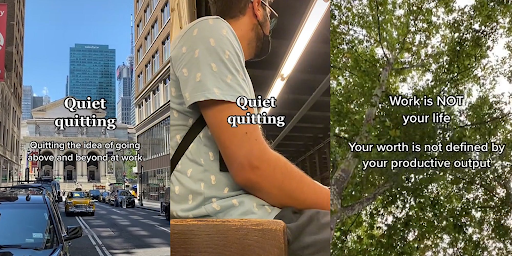Quiet Quitting: A New Epidemic

While quiet quitting is spreading throughout the working class, it’s important to remember to keep passion and future generations in mind.
Recently in the working community, a new trend, dubbed “quiet quitting,” has gained massive popularity amongst workers, particularly millennials. In essence, the trend requires the undertaker to do strictly what their occupation asks of them: nothing less, nothing more. Often, the process is heralded for its emphasis on workers “unsubscribing to the hustle culture,” and its popularity is upwardly trending. Social media has proclaimed its support for the process, with an example being r/antiwork, a subreddit where members discuss the obstacles and complications a 9-5 workday entails. However, many workers do not realize that quiet quitting is vastly counterintuitive to the undertaker, strictly for the fact that it leads to higher stress and extremely shaky job security in the long run.
In a community that used to be defined by passion, ideals are quickly fading with the upcoming generation entering the working field. Throughout their younger years, the motivation of “working smarter, not harder” is impressed upon children. Therefore, it was obvious that when they entered the working class, they would try to employ this same state of mind. In previous generations, working was often thought of to be for the passion, not for the money, as it is now. Quiet quitting counters the satisfaction of working, and while some work for what they love, many in modern American society do it purely for money. It’s not entirely the workers’ fault, but it is the factors that influenced them at younger ages. Quiet quitting, in this way, decreases the motivation and satisfaction of doing what you love, each and every day.
Without going above and beyond within professions, workers also indirectly lower the innovation and productivity that powers modern America. When only what’s strictly required gets done, new ideas are never formed, which, in the long run, is terrible for future generations. Workers need to analyze what quiet quitting does to future generations, who may grow up without technologies and innovations that could make their lives easier. Through the quiet quitting epidemic, workers harm future generations and gain a worse quality of life, which could ultimately hurt their own families in the future. With quiet quitting also comes massive job insecurity. Through doing only what is required, managers of employees see nothing the employee puts forward to the table, and without ambition comes the serious danger of the employee being without a job. This also, in obvious fashion, leads to a lower quality of life.
Many supporters of quiet quitting argue that the trend increases the mental health of its workforce occupants. By doing the bare minimum, workers are not overwhelmed with extra responsibilities, yet still get what is required done. Supporters state that doing more work than workers signed up for is inaccurate to the job contract, and companies take advantage of workers in this way. While some factors in this argument are accurate, and it is important to prioritize yourself, quiet quitting robs workers of the satisfaction of going above and beyond, of knowing that something they did contributed to the world and future generations. Passion is what powers the world, powers the people, powers motivation, and powers mental health. Doing what you love and knowing you’re contributing to society boosts mental health, and prioritizes the future over the current and the past. Thus, workers feel more satisfaction than just doing what is required.
Quiet quitting is spreading like wildfire among the younger generations, and its ideas present a massive threat to future generations of the world. As a result,less productive output is created leading to less innovation, less productivity, and a lesser quality of life. Quiet quitting also deteriorates passion and, in this way, decreases the happiness and general satisfaction a worker has. Going against the values it claims to support – mental health, a better worker and working class – quiet quitting proves is detrimental to society and occupants as a whole.






